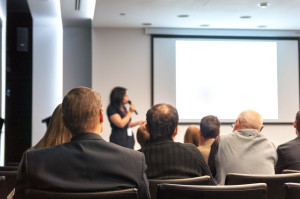Speech Tips
English Communication Skills-Time of Day Tips for Presentations, Meetings & Conversations Afternoon and Evening
English Communication Skills: Time of Day Tips for Presentations Meetings and Conversations- Afternoon and Evening – Blog 100 on June 16, 2021
Does your body feel the same in the afternoon and evening as it does in the morning? Probably not. But you do want to maximize your influence and making connections during this time of day. Here are some tips to overcome the afternoon and evening barriers to your goals:
Afternoon
- If you are leading a meeting , doing a presentation or even a one-on one conversation, — either in-person or remotely– the attendee(s) may need a coffee break. If you are in-person, do make coffee or tea available. If remotely, suggest the attendee(s) get a cup of coffee or tea before you begin. Otherwise you risk that they’ll interrupt your message to seek out coffee and miss a chunk of what you have to say.
- More likely in the afternoon is that people may be overwhelmed with data. Remember, they already put in a half-a-day work! Consider a low-key opening so they ease into your message. Provide lots of handouts or easy access to e-files so they can review details later.
- Attendees, whether in-person or remote, may need to leave early to commute home or leave to take care of other appointments. Nothing is worse for listeners than you running overtime at the end of the day. Make your endtime happen as promised.
Early evening
- Attendees whether in-person or remote may arrive late (and tired) from working all day. Respect their situations.
- Parents with young children may either need to go home early if in-person or leave the remote meeting ,presentation or conversation to put their children to bed. For in-person, have a table at the back of the room so early departures can take the info sheets without distracting the rest of the audience. For remote gatherings, provide at the beginning of the meetings, the electronic info for the extra materials
After-dinner
- If attendees are in-person, they may have been drinking alcohol at a cocktail or beer and/or wine reception. Be prepared for loud chatter.
- Attendees after dinner may simply want to socialize- and may resent a serious speech, especially one that runs too long. Engage them with your topic, your enthusiasm, your stories, and your brevity!
Contact Dr. Johnson at ALJohnson@ClearTalkMastery.com to sign up for a Free Sample Lesson with us!
Be sure to watch our English Speech Tips videos and Accent Reduction Tip videos for more English pronunciation and accent reduction exercises.
Copyright Clear Talk Mastery Inc 2021 (140716)
English Communication Skills: Presentation- Tips for Time of Day Pitfalls
English Communication Skills: Presentation Tips for Time of Day Pitfalls Blog 199
What time of day will you be speaking or doing a presentation? Will it make a difference? Absolutely.
Here are some pitfalls for morning presentations.
Breakfast/early morning
- Listeners may be groggy. Choose a stimulating issue or anecdote to open with. Get audience involvement by having them raise their hand in agreement or disagreement. Example: Raise your hand if you or someone you know wants to move in the next six months.
- People may be in a rush. Don’t do leisurely humor or drawn-out details. At breakfast, heed the great US president Franklin Delano Roosevelt’s advice: “Be sincere, be brief, be seated.”
- Listeners may be preoccupied with work tasks of the day. That affects their receptivity. Draw them into the topic with quick anecdotes or thought provoking quotations.
- People attending may be irritable. Why? Because they had to change their morning commute to attend the meeting.
Mid-morning
- Listeners may need a coffee break. Provide coffee and tea. Otherwise listeners may head to the nearest cafeteria and miss a chunk of your presentation.
- Attendees may need to use the restrooms. If your listeners have been sitting for more than an hour, give them a quick three-minute break. Otherwise, they’ll just leave in the middle anyway—interrupting other people in the audience and distracting you.
- People may need to check in to their office for messages. Again, a three minute break is good to give them a chance to make a quick call without bothering the whole room. Don’t give them too long, or they may get bogged down with expanded work details
Immediately before lunch
- Listeners are hungry and probably can’t concentrate well. If no one asks any questions before lunch, it doesn’t mean they are bored only that they’d rather go eat. A good alternative is to invite people to ask questions throughout your presentation. Be sure to keep questions and answers in check so you don’t run overtime. Audiences are very forgiving – except for making them late for lunch.
- Listeners have been sitting all morning and may need to stretch. Invite them to stand up and take a thirty-second “stretch break” right at their seats.
- Listeners may get “information overload.” Supplement your speaking with handouts so people can review material later.
Next time: What about lunch presentations?
Be sure to watch our English Speech Tips videos and Accent Reduction Tip videos for more English pronunciation and accent reduction exercises. Copyright Clear Talk Mastery 2021 (140702)
Practice Makes Perfect
Practice Makes Perfect
Rehearse out loud. The only way you can tell how your speech will sound is to do it and listen to it. That means you have to say it out loud. Doing the speech in your head and listening to it doesn’t work – that is not the voice your audience will hear. Aim for clear English so that every word is easily understandable. Copyright Clear Talk Mastery 2021 (140630)
English Communication- Don’t Shake Hands Yet- But Do Greetings and Goodbyes
English Communication: Don’t Shake Hands Yet – But Do Greetings and Goodbyes, part A
Important for this blog Wednesday, May 5, 2021, don’t shake hands yet. But do these—
‘What’s happening?’
‘How are things going?’
‘Good evening, Sir/ Ms (‘Miz’).’
In the culture of the North America, these are usually ritual greetings. If someone asks you “How are you ?” or “What’s up?”, it is a simple “hello.” The other person is expecting a one or few word reply.
This is different than many other countries, such as Romania, where a greeting is invitation to talk about the well-being of each person.
So many choices in North American greetings and goodbyes! Determine the who, when, how, and context so that you know better which to choose.
Here are ptions for expanding your ‘hello’ and ‘goodbye’:
Formal Greetings
Use for business setting, public speaking, or in the service professions, such as restaurants and retail.
- Good morning/afternoon/evening (Answer: ‘Hi’)
- Nice to meet you – Used when meeting someone for the first time. Can be used in informal settings with new acquaintances. (Answer: ‘Nice to meet you too’)
- It’s good to see you again – Used with someone you have met before. (Answer: ‘You too’)
Formal Goodbyes
Use in business setting, public speaking, or in the service professions
- It was nice to see you again (Answer: ‘You too’)
- Take care – This is also often used with friends and used especially by females. (Answer: ‘Thanks, you too!’)
- Stay safe. — Popular due to Covid pandemic. (Answer: “You, too.”)
- Have a good day/week/weekend/trip – This can also be used with friends. (Answer: ‘Thanks! You too.’)
Informal Greetings
Use with friends
- Hey! (Answer: ‘Hey’)
- What’s up? (Answer: ‘Not much’ or ‘hey’)
- Hey! Long time! (Answer: ‘Yeah, it’s been a while.’)
- How’s it going? (Answer: ‘Hey!’ or ‘Pretty good. You?’ or ‘Not bad. What about you?’, “Hanging in there.”)
- Hey! How are you? (Answer: ‘Pretty good. You?’)
Informal Goodbyes
Use with friends
- See you later (Answer: ‘Yeah!’ or ‘Later.’)
- Later (Answer: ‘See ya.’ or ‘Take care.’)
- So long. (Answer: ‘ Catch you later.’)
Later in the upcoming blog will be more on avoiding confusion with ‘How are you?’
If you want more direct practice with the clear speech mode, catch free You Tube videos at Youtube.com/ClearTalkMastery — English Speech Tips videos and Accent Reduction Tip videos .
Contributing editor: Amber McKinney
copyright Clear Talk Mastery Inc 2021 (140625)
Convincing People
Tip: Convincing People
If you want to convince people, remember this: The more separate arguments you make against your opponent’s position, the more difficult it is for your opponent to deal with each of those items.
copyright Clear Talk Mastery 2021 (140623)’










